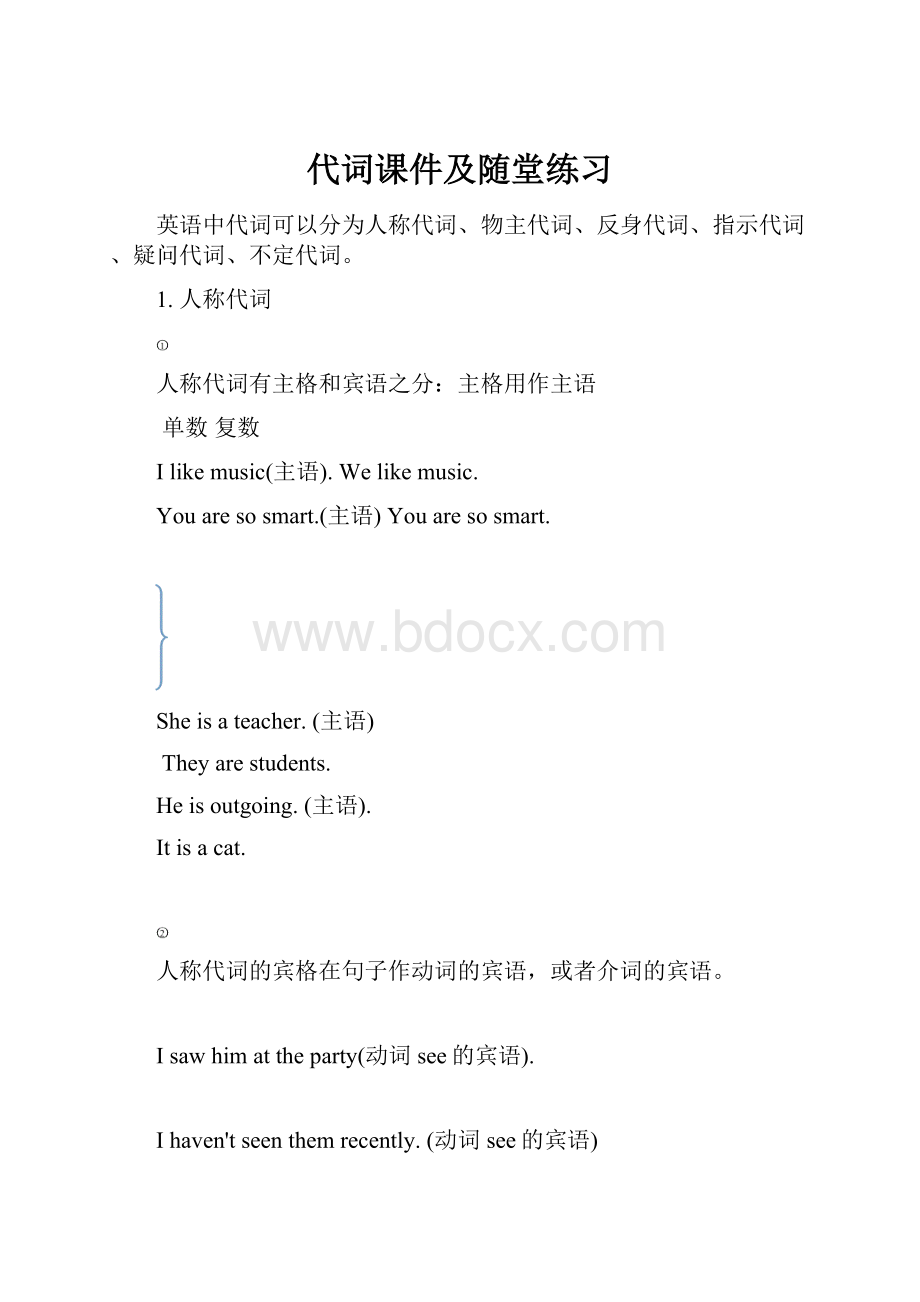代词课件及随堂练习.docx
《代词课件及随堂练习.docx》由会员分享,可在线阅读,更多相关《代词课件及随堂练习.docx(29页珍藏版)》请在冰豆网上搜索。

代词课件及随堂练习
英语中代词可以分为人称代词、物主代词、反身代词、指示代词、疑问代词、不定代词。
1.人称代词
人称代词有主格和宾语之分:
主格用作主语
单数复数
Ilikemusic(主语).Welikemusic.
Youaresosmart.(主语)Youaresosmart.
Sheisateacher.(主语)
Theyarestudents.
Heisoutgoing.(主语).
Itisacat.
人称代词的宾格在句子作动词的宾语,或者介词的宾语。
Isawhimattheparty(动词see的宾语).
Ihaven'tseenthemrecently.(动词see的宾语)
Iboughtabookforthem.(作介词for的宾语)
在口语中,人称代词的主格形式作表语时,常常可以用宾格替换。
如:
Itcan'tbehe/him.
--IsthisMr.Green?
--Yes,thisishe/him.
在口语中,当人称代词用于than,as之后或用于强调句中被强调时,用主格(较正式)
和宾格(较口语化)均可以。
如:
HesingsbetterthanI/me.他比我唱得好。
Youknowmorethanshe/her.
Ilikeyouasmuchasher.
as…as其后也应看作是省略句。
应为asIlikeher.所以应用宾格。
而第一句应译为我像她那样喜欢你。
两句语法都是对的但含义不同。
单独使用的人称代词通常用宾格,即使它充当的是主语也是如此。
如:
"IlikeEnglish.""Metoo=IlikeEnglishtoo.""我喜欢英语。
""我也喜欢。
"
-Whodidit?
--Them.(=Theydidit)
人称代词并列排序,当两个以上的人称代词并列时其排列顺序一般为you,he,she,I,而复数时为we,you,they:
如男女并列时,应先男后女,如:
Heandshe…如果在表示不好意思,承担责任时,单数时用,I,he,she,you,复数时用They,you,we,
[误]Heandyoushouldgotothelibrarytoreturnthebooks.
[正]Youandheshouldgotothelibrarytoreturnthebooks.
[析]这主要是英语习惯上的用法。
当两个以上的人称代词并列时其排列顺序一般为you,he,she,I,而复数时为we,you,they:
如男女并列时,应先男后女,如:
Heandshe…如果在表示不好意思,承担责任时,单数时用,I,he,she,you,复数时用They,you,we,如:
TomandIaregoodfriends.
You,heandImustgotoplaythegameforourteamthisafternoon.
We,youandtheyhavebeentherebefore.
I,heandyouhavetopayforit.
it代表时间、距离、天气、自然现象,或用在句中作形式主语或宾语,如:
[误]NewYorkismuchcolderinwinterthanbefore.
[正]ItismuchcolderinNewYorkinwinterthanbefore.
[析]it常常用在英文的句子中来代表时间、距离、天气、自然现象,或用在句中作形式主语或宾语,如:
Itisteno'clocknow.(代时间)
Itisfarfromheretotheairport.(代距离)
Itisveryhot.(代天气)
ItisverydifficulttolearnEnglishwell.(作形式主语)
Wefounditverydifficulttoanswerthequestion.(作形式宾语)
人称
单复数
主格
宾格
第一人称
单数
I
me
复数
we
us
第二人称
单数
you
you
复数
you
you
第三人称
单数
he
him
she
her
it
it
复数
they
them
2.物主代词
物主代词分形容词性物主代词和名词性物主代词。
形容词性物主代词在句中只用作定语,相当于一个形容词,不能单独使用;
名词性物主代词则不能用作定语,相当于一个名词词组,可以单独使用,在句中用作主语、宾语、表语、和介词of连用。
如:
Hereismydog.ItsnameisTom.(形容词性物主代词its作name的定语)
Mysisterlostherbicycle.(形容词性物主代词her作bicycle的定语)
Isthatcoffeeyoursorhers?
(名词性物主代词)
[误]Tom'smotheristallerthanmy.
[正]Tom'smotheristallerthanmine.
[析]形容词性物主代词可以作定语,也就是讲它可以作形容词,如:
mybook,而这句话的意思是:
汤姆的妈妈比我的妈妈高。
比较的对象是mymother,也就是mine。
[误]Hisbrotheristallerthanhim.
[正]Hisbrotheristallerthanhe.
[析]than是连词,其后应视为省略句,thanheis.所以要注意区分其主格与宾格的用法。
人称
单复数
形容词性物主代词
名词性物主代词
第一人称
单数
my
mine
复数
our
ourselves
第二人称
单数
your
yourself
复数
your
yourselves
第三人称
单数
his
his
her
hers
its
its
复数
them
themselves
3.反身代词
如人称代词一致,反身代词的人称和数以及性要和它所指代的名词或代词一致。
反身代词可用作宾语、同位语、表语等。
用作同位语时,主要用于加强被修饰词的语气,可紧放在被修饰名词后或句末。
如:
反身代词不可作主语,但可以用作主语的同位语。
Hehimselfwasadoctor.(同位语)
=Hewasadoctorhimself.
[误]Myselfdidityesterday.
[正]Imyselfdidityesterday.
[正]Ididitmyselfyesterday.
[析]反身代词不可作主语,但可以用作主语的同位语。
Sheistooyoungtolookafterherself.(宾语)
Idon'tblameyou,Iblamemyself(宾语).
Hecuthimselfwhenhewascooking.(宾语)
Thatpoorboywasmyself.(表语)
那个可怜的孩子就是我自己。
反身代词用于be,feel,seem,look等后作表语表示身体或精神所处的状态。
如:
I'llbemyselfagaininnotime.我一会儿就会好的。
Hedoesn'tfeelhimselftoday.他今天感觉身体不舒服
I'mnotquitemyselfthesedays.我近来身体不大舒服。
反身代词不能作介词宾语,除非是由不及物动词与介词组成的动词短语
[误]Pleasebringyourdaughterwithyourself.
[正]Pleasebringyourdaughterwithyou.
[析]反身代词不能作介词宾语,除非是由不及物动词与介词组成的动词短语,如:
Theoldwomanspoketoherself.
固定短语Makeyourselfhome.
[误]Makeyourselfhome.
[正]Makeyourselfathome.
[析]这是英语中的习惯用法,意为“像在家里一样”。
这样的用法还有:
enjoyoneself玩得开心makeyourselfathome像在家中一样
helpyourselftosomething自己拿某物lostoneself迷路
seatoneself就坐dressoneself穿衣
祈使句中的反身代词
[误]Takecareofourselves.
[正]Takecareofyourselves.(yourself)
[析]祈始句的主语应看作第二人称you.
人称
单复数
主格
宾格
形容词性物主代词
名词性物主代词
反身代词
第一人称
单数
I
me
my
mine
myself
复数
we
us
our
ours
ourselves
第二人称
单数
you
you
your
yours
yourself
复数
you
you
your
yours
yourself
第三人称
单数
he
him
his
his
himself
she
her
her
hers
herself
it
its
its
its
itself
复数
they
them
their
theirs
themselves
小插曲:
Be动词有三个am,is还有are我用am你用are,is跟着他她它
主语表示单数意义用is主语表示复数意义,全部都用are.
1.I _____ a student.
2.You ____ a doctor.
3.she_______ from Jinan.
4.You_____American.
5.He _____ in Class 4, Grade 1.
6.It_____ a car.
7.They ____ cars.
8.Your mother_______ in China.
9.Your friends______ in New York.
10.These _____ buses.
4.指示代词
单数
复数
例子
this/that
these/those
Thisismybook.(主语)
Iwantthat.(宾语)
Mybookisthat.(表语)
为避免重复,可用that和those代替前面提到的名词。
如:
Theplaygroundofthisschoolisbiggerthanthatofthatschool.(That=theplayground)
Myseatisnexttothatofthemayor.(that=mayor'sseat)我的座位在市长座位旁边。
[误]Thedaysinsummerarelongerthanthisinwinter.
[正]Thedaysinsummerarelongerthanthoseinwinter.
[析]在比较句中往往为了避免重复,可以用that或those取代前面提到的事物,如是单数时用that,复数时用those,如:
TheweatherinBeijingishotterthanthatinChangChun.
用来回指上文提到的事情时,可用this或that,但是若要指下文叙述的事情,通常要用this。
如:
--Sheisabeautifulgirl.
--Whosaidthat?
Iwanttoknowthis:
Isshebeautiful?
我想知道这一点:
她美吗?
在打电话时,通常用this指自己,用that指对方:
Hello.ThisisJim.IsthatJohn?
喂,我是吉姆,你是约翰吗?
[误]— Who'sthisspeaking.— That'sMary.
[正]— Who'sthatspeaking.— ThisisMary.
[析]在电话用语中,this指讲话人自己,而that指对方。
除用作代词外,this和that还可用作副词,用以修饰形容词或副词,意为"这么""那么",相当于so。
如:
I'vedoneonlythatmuch.我所做的就这么多。
Ishealwaysthisbusy?
他总这么忙吗?
指示代词this,that和these在作主语时可指物也可指人,但作其他句子成分时只能指物,不能指人。
而those作宾语后接定语从句时可以指人。
而且只有that、those后面可以跟定语从句。
如:
Thatismyteacher. 那是我的老师。
(that作主语,指人)
Heisgoingtomarrythisgirl. 他要和这个姑娘结婚。
(this作限定词)
Heisgoingtomarrythis. (this作宾语时不能指人)
Iboughtthis. 我买这个。
(this指物,可作宾语)
Headmiredthosewholookedbeautiful.他赞赏那些外表漂亮的人。
(those指人)
Headmiredthatwhodancedwell. (that作宾语时不能指人)
Headmiredthatwhichlookedbeautiful. 他赞赏外表漂亮的东西。
5.不定代词
不定代词
不定代词是不指明代替任何特定名词或形容词的代词。
英语中不定代词有:
some(something,somebody,someone,somewhere),any(anything,anybody,anyone,anywhere),no(nothing,nobody,noone),every(everything,everybody,everyone,everywhere),all,each,both,much,many,(a)little,(a)few,other(s),another,none,one,either,neither等。
body
one
thing
where
some
somebody
someone
something
somewhere
any
anybody
anyone
anything
anywhere
every
everybody
everyone
everything
everywhere
no
nobody
noone
nothing
nowhere
every/each
every
三者或三者以上的每一个
every则侧重于全体
every只可作形容词,不可作代词
each
二者或二者以上的每一个
each侧重强调个体
each既可作形容词,又可作代词
判断
1)[误]Therearetreesoneverysidesofthestreet.
[正]Therearetreesoneachsideofthestreet.
[析]every用于三者或三者以上的每一个,而each用于二者或二者以上的每一个。
因为街道只有两侧,所以只能用each而不能用every.
2)[误]Weeachhasaticketfortheconcert.
[正]Weeachhaveaticketfortheconcert.
[析]each作句子主语时其谓语动词要用单数形式,如:
EachofuswantstolearnEnglishwell,但each作同位语时,则应以原名词的数为准。
3)[误]Everyofushastopasstheexam.
[正]Eachofushastopasstheexam.
[析]every只可作形容词,不可作代词,而each既可作形容词,又可作代词,在作形容词时each侧重强调个体,而every则侧重于全体。
theothers=other+名复
[误]TherearetenstudentshereWherearetheothersstudents?
[正]Therearetenstudentshere.Wherearetheothers?
[正]TherearetenstudentshereWherearetheotherstudents?
[析]theothers=theotherstudents.
[误]Somepeoplelikesports.Theotherslikereading.
[正]Somepeoplelikesports.Otherslikereading.
[析]在泛指的复数名词前用some…others…others…来表示某些人……某些人……某些人……。
one/another/theother
one
one作代词时,它的复数形式是ones,所有格形式是one's,反身代词为oneself
another
another用于单数可数名词在泛指某一个时用another,
theother
theother用作代词时它的含意一定是单数
判断
1)[误]Everyoneshoulddoone'sbest.
[正]Everyoneshoulddohisbest.
[析]one作代词时,它的复数形式是ones,所有格形式是one's,反身代词为oneself.如果讲Oneshoulddoone'sbest.则是对句。
如果one与别的词组成其他词,如:
someone,anyone,everyone或onlyone则要用his/her,来作其所有格形式。
2)[误]Theoldmanhastwosons.Oneisateacher,anotherisadoctor.
[正]Theoldmanhastwosons.Oneisateacher,theotherisadoctor.
[析]another用于泛指,如:
Isitfarfromheretothestation?
I'msorry.Ihavenoidea.Onemaysayitisquitenear;anothermaysayitisfarfromhere.但在特指时则要用theother.它可以用作定语,theotherone,也可以用作代词theother,但theother用作代词时它的含意一定是单数。
如果指三者或者三者以上的情况时,则要用one…another…theother.或者one…asecond…thethird…
3)[误]Thepostofficeisonothersideofthestreet.
[正]Thepostofficeisontheothersideofthestreet.
[析]单数可数名词如在泛指某一个时用another,而特指时则要用theother,因街道只有两边,而不在这边必定是在另一边,所以要用特指。
some/any
[误]Iwantanybookstoread.Doyouhaveany?
[正]Iwantsomebookstoread.Doyouhaveany?
[析]按照语法any用于疑问句和否定句,而some用于肯定句。
something/anything不定代词应被看作单数,即使用and连接两个不定代词,也要看作单数
[误]Wouldyoulikeanythingtodrink?
[正]Wouldyoulikesomethingtodrink?
[析]在由wouldyoulike发出的问句中,表达了说话者真心实意要为对方提供些饮料,或在说话者想得到对方的肯定答复时,在疑问句中要用some而不用any。
[误]Someonewanttomeetyou.
[正]Someonewantstomeetyou.
[析]不定代词应被看作单数,即使用and连接两个不定代词,也要看作单数,如:
Anyoneandeveryonehastheright.任何人,每一个人都有这样的权力。
many/much
much用于不可数名词,作主语时用单数谓语动词。
而many用于可数名词,它作主语时用复数形式的谓语动词。
[误]Muchofwhatyousaidaretrue.
[正]Muchofwhatyousaidistrue.
[析]much用于不可数名词,作主语时用单数谓语动词。
而many用于可数名词,它作主语时用复数形式的谓语动词。
[误]Becareful.Don'tdrinktoomany.
[正]Becareful.Don'tdrinktoomuch.
[析]这里much所代的应是饮料或水,所以应为不可数名词。
few/little
little与few用于句中时,均要按否定句看待。
few用于可数名词,意为几乎没有,但few作主语时谓语动词则要用复数形式。
[误]Manyknowhim,butfewlikeshim.
[正]Manyknowhim,butfewlikehim.
[析]few用于可数名词,意为几乎没有,但few作主语时谓语动词则要用复数形式,而afew为有一些。
[误]Youhavefewfriends,haven'tyou?
[正]Youhavefewfriends,haveyou?
[析]little与few用于句中时,均要按否定句看待。
both/all
[误]Welikeboththislittleboy.
[正]Webothlikethislittleboy.
[析]both作同位语时,它在句中的位置有:
在be动词之后,如:
Wearebothstudents.在实意动词